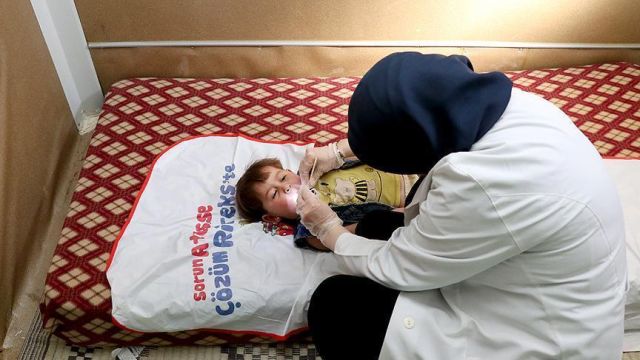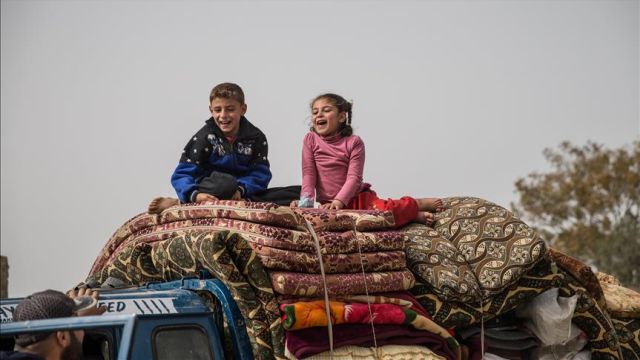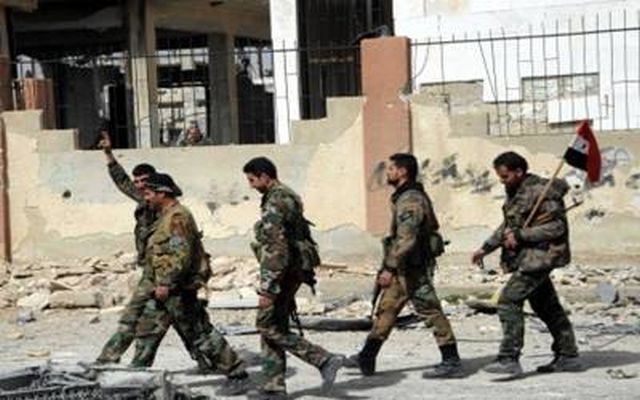
by Editor | May 25, 2021 | Muslim World
 Ankara : A new migration health center opened on Monday to serve over 70,000 Syrians in Turkey’s central Kayseri province.
Ankara : A new migration health center opened on Monday to serve over 70,000 Syrians in Turkey’s central Kayseri province.
A total of 12 Syrian doctors will also work in the center built by the Turkish Ministry of Health under the EU project.
More than 3.5 million Syrians are staying in Turkey, said Kanuni Keklik, head of General Directorate of Public Health of Migration Health Department.
There are 500,000 Syrian doctors and nurses in Turkey, Keklik said, and added: “We want to include them in the Turkish healthcare system.”
Nearly 35 million Syrians have been provided with ambulatory care services since the beginning of the civil war in Syria, he noted.
Around 1.5 million of the patients were treated in the hospital, while more than 1.3 million surgeries were performed. Over 325,000 women delivered babies, Keklik added.
—AG/UNA-OIC

by Editor | May 25, 2021 | Muslim World
 By Cansu Dikme,
By Cansu Dikme,
Ankara: A document released Wednesday after an international conference on Syria hailed Turkey’s “unparalleled generosity” in its support for Syrian refugees.
Saying that Turkey is home to the largest refugee population in the world, a document titled “Assistance to Syrian refugees in Turkey” released following the second Brussels Conference on “Supporting the Future of Syria and the region” also praised Turkey’s leading role in global best practices.
“Since the beginning of the crisis, the Government and people of Turkey have demonstrated unparalleled generosity in supporting refugees and integrating them into national services, including health, education, employment and other municipal and social services,” it said.
“Turkey has also led in global best practices and agreed principles including the New Way of Working and the Comprehensive Refugee Response Framework (CRRF), while not being an official CRRF country,” it said.
It also stressed the need for sharing Turkey’s “responsibility and burden of hosting and integrating refugees into their systems and services”.
The Belgian capital of Brussels hosted an international conference on Syria organized by the United Nations and the European Union from April 24-25.
The conference pledged $4.4 billion for Syrian refugees, said Christos Stylianides, the European commissioner for humanitarian aid and crisis management.
Stylianides said the meeting’s number one priority was a political solution in support of UN-led talks in Geneva and the transition to a peaceful, democratic and stable Syria
Representatives from 85 countries and non-governmental organizations attended the conference.
Syria has been locked in a vicious civil war since 2011 when the Bashar al-Assad regime cracked down on pro-democracy protests with unexpected ferocity.
Since then, hundreds of thousands of people have been killed in the conflict, according to the UN.
—AA

by Editor | May 25, 2021 | Muslim World

Palestinian protesters wave Syrian and Palestinian flags (file photo of PTI)
Washington/Damascus/Moscow/London : The US, Britain and France launched coordinated strikes against Syria’s research, storage and military targets to “punish” the Bashar al-Assad regime for an apparent chemical attack in Douma that killed over 70 people. The military action was denounced by Damascus and its ally Moscow as a “failure” and “an act of aggression”.
Western allies warned Syria on Saturday that they could launch further attacks if chemical weapons were used again. The strikes on Friday night was intended to show Western resolve in the face of what the leaders of the three nations called “persistent violations of international law”.
US President Donald Trump via a tweet hailed the overnight military strike as “perfectly executed”, adding: “Mission Accomplished”.
The strikes targeted three facilities associated with Syria’s chemical weapons arsenal, including a scientific research facility around Damascus, a chemical weapons storage facility around Homs alleged to be used for sarin gas and a nearby command post, said the Pentagon.
The Syrian Observatory for Human Rights said the Syrian Army’s 4th Division and Republican Guard were among the targets. US aircraft including B-1 bombers, naval vessels and about 100 Tomahawk cruise missiles were used in the attack, the Pentagon said.
“The nations of Britain, France and the US have marshalled their righteous power against barbarism and brutality,” Trump said in an address after the strike.
“The purpose of our actions is to establish a strong deterrent against the production, spread and use of chemical weapons…The wave of strikes is the most significant attack against Assad’s government by Western powers in seven years of Syria’s civil war,” he said.
“We are prepared to sustain this response until the Syrian regime stops its use of prohibited chemical agents,” he added.
In Syria, the Foreign Ministry described the missile strikes as “barbaric aggression”. Assad said that it reflected the “failure” of Western powers to achieve their goals in Syria after the defeat of the foreign-backed militants.
The Syrian military claimed that its air defences shot down a majority of the 110 missiles launched at dawn by the Western allies and claimed only the research facility in Damascus had been damaged. Russia said that Syrian forces used older Soviet-made air defence systems to intercept incoming missiles.
Civilians and soldiers gathered in Ummayad Square in Damascus for a show of support, waving Syrian flags and dancing to songs that praised the Army.
Russian President Vladimir Putin slammed the US and its allies, saying that Washington was “increasingly exacerbating the humanitarian catastrophe in Syria” and called for an immediate UN Security Council meeting to discuss the “an act of aggression”.
He said the US used a “staged chemical attack” against civilians to carry out the latest strike, adding that Russian military experts did not find any traces of chlorine gas or other poisonous substances in Douma.
Russian Foreign Ministry spokeswoman Maria Zakharova said that “the action against Syria came precisely at the moment when the country received a chance for a peaceful future”.
Iran’s Supreme Leader Ayatollah Ali Khamenei called the attack a “crime” but gave no indication of any planned Iranian response. Iran and its main proxy force in the region, Lebanon’s Hezbollah, are both key allies of Syria.
British Prime Minister Theresa May and French President Emmanuel Macron confirmed their countries’ involvement in the action with the former saying that “Syria had left the allies no choice”.
Macron, talking about the Douma chemical attack, said: “Dozens of men, women and children were massacred with chemical weapons. The red line had been crossed.”
“France and its partners will today resume their efforts at the UN to enable the creation of an international mechanism to establish responsibility, prevent impunity and obstruct any temptation on the part of the Syrian regime to repeat these acts.”
Nato Secretary General Jen Stoltenberg tweeted that those who use chemical weapons “must be held accountable”.
The EU said it “was supportive of all efforts aimed at preventing the use of chemical weapons”.
German Chancellor Angela Merkel — who had ruled out joining the military action — said she supported the strikes as “necessary and appropriate”.
UN Secretary General Antonio Guterres warned UN members of their responsibilities. “I urge all member states to show restraint in these dangerous circumstances.”
China’s Foreign Ministry urged negotiation and called for a “comprehensive and impartial” investigation into the allegation that chemical weapons were used.
Meanwhile, a fact-finding mission from the Organization for the Prohibition of Chemical Weapons was to begin investigating the episode on Saturday in Douma, which had been held by rebels before the suspected attack.
—IANS

by Editor | May 25, 2021 | Muslim World
 By Halil Fidan and Behcet Alkan,
By Halil Fidan and Behcet Alkan,
Afrin, Syria : Syrians are now enjoying a free and secure travelling from Syria’s Azaz district to Idlib province after Afrin region was cleared from YPG/PKK terrorists as part of Turkish-led Operation Olive Branch.
Speaking to Anadolu Agency, locals say they previously had to pay a huge amount to the terror group while going to northern Idlib province, which borders Turkey.
“Thank God, we’ve got rid of terrorists,” Ibrahim Ugla, a resident of Afrin, told Anadolu Agency while he was preparing to set out for Afrin with his belongings.
Syria’s Afrin region has been taken under “complete” control as part of Turkish-led Operation Olive Branch, the Turkish military said on Saturday.
“Previously, they [terrorists] were demanding a $1000 ransom for large vehicles and $500 for small ones. It was a huge amount. People were not able to travel for this reason,” he said.
Ugla thanked Turkey for its support to the people of Syria.
“Our neighbor and friend Turkey have been protecting Syrians for years. Many of our brothers have been living in peace there. Now, Turkish soldiers are trying to provide peace here. God bless them.”
Speaking to Anadolu Agency, Fatma el-Hamdo, another Syrian, also expressed her happiness to be freed from terrorists.
“Previously, we were afraid of terrorists[…] They used to take money from us while we were travelling.”
A total of 3,733 terrorists have been ‘neutralized’ since the start of the Operation Olive Branch in Syria’s Afrin region, the Turkish military said in a statement on Saturday.
Turkish authorities often use the word “neutralized” in their statements to imply the terrorists in question either surrendered or were killed or captured.
Turkey launched Operation Olive Branch on Jan. 20 to clear terrorist groups from Afrin in northwestern Syria amid growing threats from the region.
The operation is being carried out under the framework of Turkey’s rights based on international law, UN Security Council resolutions, its self-defense rights under the UN charter, and respect for Syria’s territorial integrity, it said.
The military also said only terror targets are being destroyed and “utmost care” is being taken to not harm civilians.
—AA

by Editor | May 25, 2021 | Muslim World
 Damascus : A humanitarian aid convoy on Monday entered for the first time in over two weeks the besieged rebel-held area of Eastern Ghouta on the outskirts of Syria’s capital, following intensified bombing by Syrian government forces that has killed over 700 people.
Damascus : A humanitarian aid convoy on Monday entered for the first time in over two weeks the besieged rebel-held area of Eastern Ghouta on the outskirts of Syria’s capital, following intensified bombing by Syrian government forces that has killed over 700 people.
The convoy successfully arrived in Douma, the largest city in the Eastern Ghouta region, with 46 truckloads of health and food supplies, the UN Office for the Coordination of Humanitarian Affairs in Syria said on Twitter.
“The UN and Red Crescent are entering Douma in Eastern Ghouta with health and nutrition supplies, along with food for 27,500 people in need,” the OCHA said on its account.
However, the OCHA also stated that “many life-saving health supplies were not allowed to be loaded” into the convoy by the Syrian government.
A World Health Organisation spokesman, Tarik Jasarevic, said that Syrian authorities had removed various medical supplies from the UN convoy before it was allowed into Eastern Ghouta.
The Syrian Observatory for Human Rights (SOHR), a United Kingdom-based war monitor, said that the Syrian Army and its allies continued to advance into Eastern Ghouta despite the entry of the aid convoy.
The SOHR added that unidentified aircraft had bombed different parts of the rebel-controlled area, but did not list the convoy’s destination, Douma, among the targeted locations.
The war monitor said that pro-government forces appeared to be trying to cut the rebel-held area into two sections, and that there had been widespread civilian displacement ahead of the government’s advance.
A spokesperson for the International Committee of the Red Cross, Ingy Sedky, told Efe news that the distribution of assistance was a “positive first step to reduce the suffering of civilians in the area”, but stressed that humanitarian organizations needed continuous access to Eastern Ghouta.
The aid convoy, led by the OCHA’s humanitarian coordinator in Syria, Ali al-Za’tari, was the first to enter the besieged region since February 14.
Since February 18, Eastern Ghouta has been heavily bombed by Syrian and Russian aircraft, as well as by artillery and surface-to-surface rockets.
The bombings have killed at least 724 people, including 151 children and 93 women, according to the SOHR.
According to the UN, some 400,000 people remain trapped in Eastern Ghouta’s rebel-held network of towns and satellite cities on the outskirts of Damascus, which has been under siege by forces loyal to the Syrian government for several years, preventing much-needed food and humanitarian aid from entering.
Defiant President Bashar al-Assad said on state television on Sunday that the offensive against “terrorism” should continue and dismissed dire assessments of the humanitarian situation in the enclave as “ridiculous lies”.
The US had condemned the Syrian government assault and blamed Russia of killing innocent civilians in name of conducting counterterrorism operations.
—IANS

 Ankara : A new migration health center opened on Monday to serve over 70,000 Syrians in Turkey’s central Kayseri province.
Ankara : A new migration health center opened on Monday to serve over 70,000 Syrians in Turkey’s central Kayseri province.



